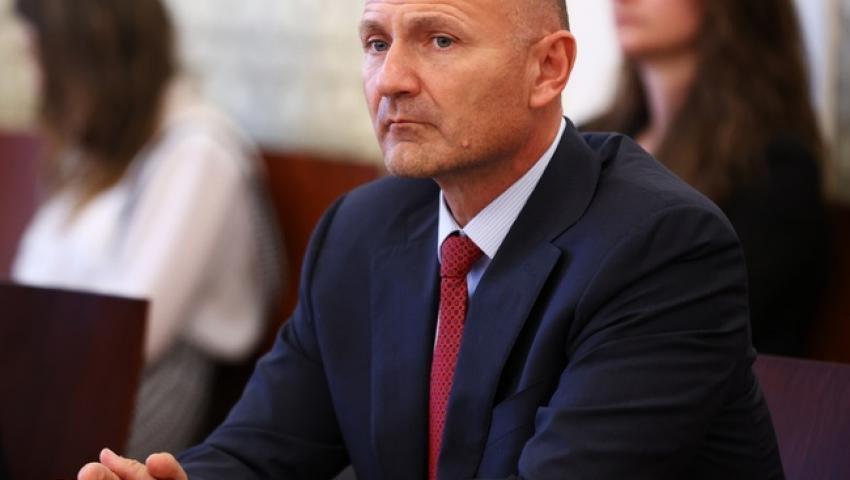Minister Hristov: The commitment in PVU to withdraw Bulgartrnsgaz and ESO from BEH must be renegotiated

The commitment laid down in the Recovery and Sustainability Plan (RPP) for the withdrawal of "Bulgartransgaz" and the Electricity System Operator (ESO) from the structure of the Bulgarian Energy Holding (BEH) must be renegotiated. This was said by the Acting Minister of Energy Rosen Hristov during a hearing in the National Assembly. According to him, removing them from the structure of BEH will make the work of the holding more difficult.
"We have strongly stated the request to renegotiate this commitment and for the two system operators to remain in the composition of BEH, proposing measures to guarantee their impartial and transparent management", stated Hristov. Otherwise, according to him, it could lead to immediate demandability and the funds taken would have to be returned. Moreover, in a very vague way, these operators will be managed and financed so that they can carry out their activities.
According to the Minister of Energy, for certain commitments that we want to renegotiate under the EPA, such as the part with energy storage batteries and the geothermal energy project, our country finds understanding from the EC. Rosen Hristov also explained the idea of preserving coal power in combination with accelerated construction of photovoltaic power in the Mariska basin by state companies and private investors.
According to him, when our country informed the European Commission (EC) that there was no way to meet the set goal of a 40% reduction in emissions, the EC's response was that if the commitments were not fulfilled, the payments would not be received either. from BGN 17-18 billion. According to the minister, this sum includes the money from the Recovery and Sustainability Plan (RSP), that from REPowerEU, as well as from the territorial plans for a just transition. He recalled that the PVA was signed on the last day of the last regular government, and it is currently being renegotiated, which is a more difficult task. "If we simply give up on this goal, the state loses around BGN 17-18 billion," said Rosen Hristov.
He explained that the EC has stated that there are three options - for Bulgaria to give up the goals set in the PVA, and then the EC will also refuse the payments. The second option is for our country to partially fulfill the goals by receiving a partial payment. The third option is to reform the targets, possibly not meeting the 40 percent reduction in emissions set in the plan, but replacing it with an accelerated deployment of renewable energy sources (RES). The goal is generally to achieve some kind of decarbonization, Hristov pointed out.
According to Minister Hristov, the first and second options are unacceptable. Therefore, according to him, it is possible to reduce carbon emissions below the target of 40% at the expense of accelerated construction of renewable energy sources. This makes up the difference. "Precisely in this connection, various options for the accelerated construction of various types of renewable energy sources, including the territories and mines, are being discussed," added the official energy minister. At the same time, it became clear from his words that the construction of photovoltaic capacities in the Mariski Basin will also require an upgrade of the power transmission network. However, this makes the projects not particularly attractive to investors, as they are technically difficult and require serious investment. According to him, investors with experience in the construction and operation of RES, as well as with the necessary capital for their construction, will be sought. Priority will be given to companies that plan to open businesses and use this energy that will be produced. In addition, among the conditions for future investors will be reclamation, which, however, makes the projects at the border of economic profitability.
Given that Bulgaria has made a commitment and strives for full decarbonization by 2050, this is only possible through the electrification of transport, the electrification of industry, the replacement of natural gas with hydrogen, which is produced with the help of electricity, as well as energy efficiency, so the development of the networks is key to the overall achievement of the decarbonization goals, he further explained.
According to Hristov, in the Recovery and Sustainability Plan, the REPowerEU part, there are several projects with the beneficiary Energy System Operator (ESO), which provide for the replacement or development of a new electricity transmission network in the key areas. One is the Mariska Basin, the second is that of North-Eastern Bulgaria, where there is the greatest potential for energy from wind turbines. And since the Marishki basin and other coal areas are planned for industrial development, there will also be a need for additional capacity of the power transmission network not only for the connection of renewable energy sources (RES), but also for all energy consumers.
Rosen Hristov pointed out that Bulgaria is far behind compared to other European countries by RES share in the total energy mix. Therefore, our country must balance the energy mix with more RES capacities and low-emission sources.
In response to a question about how many benefits would be lost from closing our coal plants, the Acting Energy Minister replied that he could not give an exact amount. However, he pointed out that they are currently loaded up to 20%. The reason is that the price of the electricity they produce is more expensive than the market price. The situation in winter is different. Therefore, they are then loaded up to 100 percent.
According to Minister Hristov, it is important to justify their existence as a balancing power. Then their work is determined by energy security, not by electricity consumption. "It is precisely in this direction that we are moving, and this is the main argument of the Ministry of Energy when we negotiate the operation of these capacities," Rosen Hristov also stated.
